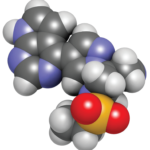 An observational study of the relative risk for venous thromboembolism events from two immunotherapeutic modalities used to treat rheumatoid arthritis (RA) finds a numerical—but not statistically significant—increase of venous thromboembolism from tofacitinib when compared with tumor necrosis factor (TNF) inhibitors.1 In 2012, tofacitinib became the first Janus kinase inhibitor (jakinib) approved by the U.S. Food & Drug Administration (FDA) to treat RA. But research into high-dose baricitinib therapy for RA and a post-marketing study of tofacitinib and TNF inhibitors to assess cardiovascular risk have raised questions about the association of jakinibs with venous thromboembolism.2-4
An observational study of the relative risk for venous thromboembolism events from two immunotherapeutic modalities used to treat rheumatoid arthritis (RA) finds a numerical—but not statistically significant—increase of venous thromboembolism from tofacitinib when compared with tumor necrosis factor (TNF) inhibitors.1 In 2012, tofacitinib became the first Janus kinase inhibitor (jakinib) approved by the U.S. Food & Drug Administration (FDA) to treat RA. But research into high-dose baricitinib therapy for RA and a post-marketing study of tofacitinib and TNF inhibitors to assess cardiovascular risk have raised questions about the association of jakinibs with venous thromboembolism.2-4
Janus kinases are believed to play an important role in inflammatory processes by signaling more than 50 cytokines and growth factors. Small-molecule jakinibs, starting with tofacitinib and then baricitinib, approved by the FDA for RA in 2018, have expanded treatment options. They offer a novel treatment modality with the potential to become as important as TNF inhibitors in treating RA, says Rishi J. Desai, MS, PhD, assistant professor of medicine at Harvard Medical School, Boston, and an associate epidemiologist in the Division of Pharmacoepidemiology and Pharmacoeconomics at Brigham and Women’s Hospital, Boston. He is the lead author of the new study.
Tofacitinib is a targeted, synthetic, disease-modifying anti-rheumatic drug (DMARD) that inhibits components of the intracellular inflammatory signaling cascade. Its oral administration offers obvious advantages for ease of use, especially because treatment may be needed for a patient’s lifetime. An important concern raised with jakinibs is the risk for venous thromboembolism, even though that happens fairly infrequently, Dr. Desai says.
Tofacitinib has also been studied to treat Crohn’s disease, ulcerative colitis and alopecia areata. Other promising jakinibs under investigation for RA and other autoimmune diseases include filgotinib, which is under investigation for psoriatic arthritis and RA; upadacitinib, which is FDA-approved for RA; abrocitinib, which targets JAK 1; and Pfizer’s JAK 3 inhibitor PF-06651600.
Is Venous Thromboembolism a Class Effect?
“We were curious: Was the venous thromboembolism risk a class effect with JAK inhibitors? We decided to look to population-based studies to get at this question,” Dr. Desai tells The Rheumatologist.
The researchers drew on two, large-population, data sources commonly used in the study of RA, Truven Health Analytics’ proprietary Market Scan Database for the years 2012–16 and the Medicare Parts A, B and D database for the years 2012–15. Researchers performed separate analyses of each database and then a combined analysis.




